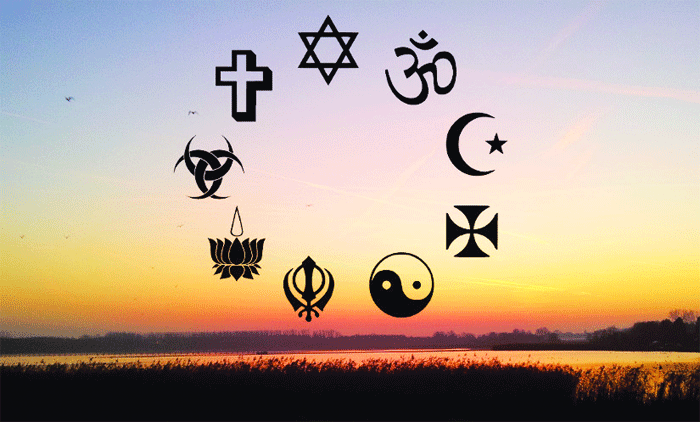All religions teach one thing — caring for people. An integral aspect of any religion is how it is adding value to our lives, writes Radhanath Swami
God appears in many wonderful ways according to time, place and situation. When people say why there are so many different religions, they are right; actually there is only one religion. Religion means obedience to law of God for developing love for God. It’s called Sanatana Dharma, which means we all are part and parcel of God and our constitutional position is to serve him with love. Sanatana Dharma is the essential truth that underlies all religions.
God reveals himself at appropriate time to fulfill his purpose of re-establishing the principles of Sanatana Dharma. The lord either comes himself or sends his representatives whether as Jesus Christ, Mohammed or Buddha. Everyone needs affection. It’s the fundamental craving of the heart — to give affection and to receive affection. Prema is the eternal nature of the soul — to love, to serve. And in that comes the greatest enjoyment.
If we read the pastimes that lord Krishna enacted in Vrindavan 5,000 years ago, they are nothing but affection. Everything is just different ways — exciting, dynamic and variegated of expressing and receiving affection. That’s why everything is created: To be utilised for the purpose of expressing our affection and receiving affection. That’s all that really matters in life.
If we are sick, we should try to get better; it’s our duty. It’s God’s body, so we should make it better. But even the healthiest people in the world are depressed, are taking all kinds of anti-depressants, are having nervous breakdowns and committing suicide. Health does not make us happy. Wealth does not make us happy. What if we own everything in the world but we are the only person living in the worldIJ Who are we going to enjoy all the things withIJ We can’t really have affection, which is reciprocal, with things. We have to have people.
So this is the nature of the soul and this is the nature of God. In the Christian world they often say, “God is love.” What does that meanIJ Devotion is the eternal natural energy of the soul. It simply means that we should repose the affection that we have within our hearts towards God in a favourable way that pleases him. That’s all. That’s all that we have to do for perfection. Bhisma in Mahabharata was always upright, loyal and true in the service of the lord. Although as an instrument in the lord’s hands, he had to play a thankless role and be misunderstood forever. Generally, people think that Bhisma was obliged to Duryodhana because he was receiving food from him and thus he had to be on his side.
The real reason that Bhisma accepted the side of Kurus was the will of lord Krishna. Because when Krishna wants to show a fantastic example to the whole world, he uses his devotee. Even if his devotee has to temporarily become his enemy, the devotee accepts that position out of love. So Bhisma understood Krishna’s plan. He wanted to show the whole world in the coming ages the most important principle in life: Whoever we are, however wealthy we are, however powerful, famous, beautiful, learned or renounced we are, if we are not on the side of Krishna, then we will be defeated. And irrespective of who we are, if we are on the side of Krishna, we will be victorious because Krishna is achyuta or unconquerable. But the unconquerable Krishna agrees to be conquered by the love of his devotees; he says in Bhagavad Gita (9.31): “Kaunteya pratijanihi na me bhaktah pranashyati.”
“Arjuna, declare that my devotee will never perish; I will always protect my devotee. But how I protect him is not according to his choice; that is according to my choice. I may protect him by kicking him, punching him, taking everything away from him or I may protect him by giving him the whole world.”
All religions teach one and the most eminent thing — caring for people. An integral aspect of any religion is how it is adding value to the lives of people. And happiness is more than a superficial smile. It is a sense of well-being and commitment to a cause that is truly beneficial to the world. This type of spirit requires great leaders that are connected spiritually and have the emotional intelligence to fulfill many people’s expectations simultaneously. They are visionaries and followers of higher principles. Because they are satisfied internally, their subordinates also naturally feel satisfied in their presence.
In Bhagavata Purana 5.4.18, it is described how the citizens of lord Rishabha were so satisfied with their king that they never asked for anything. Rather they were always absorbed in affection for him.
Bhagavad Gita teaches that God is the source of everyone. From him comes the essence of all the great spiritual paths and religions of the world. When we understand that one God and that everything is the property of that one God —that nothing is mine and that we are simply caretakers of whatever abilities we have, whatever intelligence we have, whatever fame and influence we have, whatever money and property we have, then we can lead responsibly.
What does it mean to be a caretakerIJ Every living being is a child of God. When we connect to our own soul, it’s no longer a matter of getting some tax relief or fame for giving in charity, it’s a matter of genuine care. These are my family members. That’s the nature of a spiritual connection. When we see all living beings as God’s children, then we really care. We cannot be happy unless they are happy: Para dukha dukhi. Human evolution is going from the obsessive need to get things to the joy of giving — that’s the nature of the soul.
The writer is an ISKCON spiritual leader

























